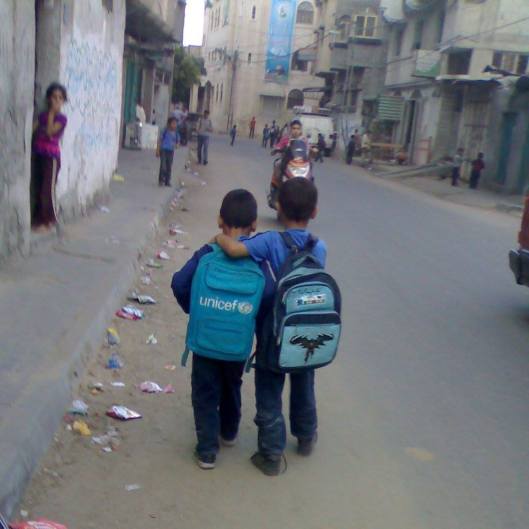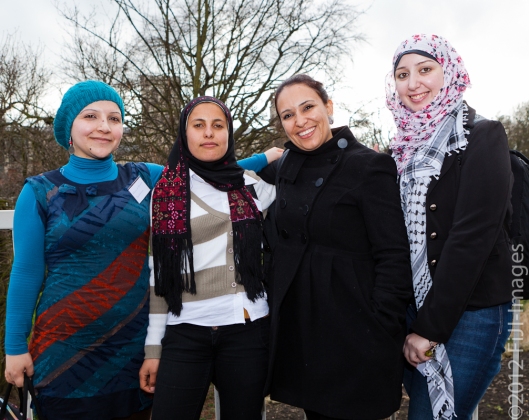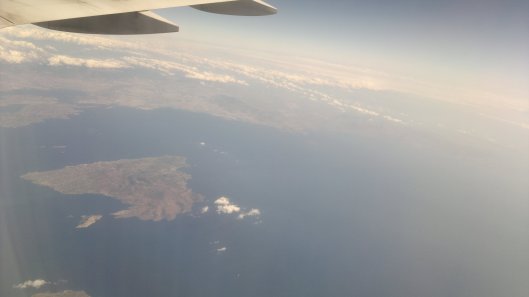Narrating Palestine: On Culture, Narrative and Palfest in Gaza
We bid farewell to Susan, Ali, Lina and Nora yesterday after four days of Palfest (Palestine Festival of Literature) events in Gaza. But even after they left, I can still inhale the air of euphoria that accompanied their presence filling the space. During their stay, an air of easiness prevailed; and those internal feelings of entrapment, of imprisonment, of siege, which troubles the feigned normalcy of our everyday life, were suddenly suspended. Gaza was no longer the bearer of borders, the enclaved concentration camp, or the inevitability of death and life. We transcended that through imagination; or maybe I did.
Maybe fishermen, uncertain of the limits of the sea, on their boats which lights we’ve seen in the horizon were not feeling that status of ecstasy that filled us all. Maybe farmers, sleeping over for an early day of harvest at dawn under gunfire could not either. Maybe warplanes hovering over our skies could not see how undefeated our spirits were and how unconfined our imagination, watching over the lights of Al-majdal from a spot along the sea of Gaza.
Maybe they have not seen that we’ve conquered their siege, we’ve dismantled their checkpoints, we’ve torn down their walls, we’ve transcended their borders, and we’ve laughed over how rude settlers were to dare infiltrate our reality. And Despite over 65 years of displacement, Gaza still had the capability to reconnect us all to our identity.
For the past week of Palfest, Gaza has been the representation of home and the imagination of what home could look like.
Narrating Palestine:
Recently, the possibility for me to narrate Palestine while being in Ghazzah has started to get difficult: the ability to see beyond the normalcy of everyday life, the exhaustion of dreams, the constant pursuit of life, the disappointment with home, the inability to change, the radicalism of my views have made it hard to do so.
Palestinian Narrative has been the main topic of Susan Abu Al hawa’s workshops during Palfest. She was very keen on discussing Palestinian Narrative in the West and its development, and we respectively were attentively listening overwhelmed with questions. The discussion groups which took place on the first and the second day of the Festival were attended by a significant number of Palestinians interested in literature whether students, scholars, writers, bloggers, or activists. Questions following the workshop have shown a great appreciation of Susan’s work, most significantly is her “Mornings in Jenin”. Curious readers wanted to know what inspired her, they wanted to listen to why she made that character look that way and they were dying to know what happens to Hassan!
Susan explained how the narrative on Palestinians and their representations evolved. It was in the seventies when Palestinians started addressing the West through hijacking Planes and it was then that the West started acknowledging that Palestinians actually existed and that was a narrative of asserting that we exist after which Palestinians were demonized and dehumanized in Western propaganda. Before that, it was Israel that took over the narrative and could strongly build a narrative that depends on the negation of Palestinians and which was based on the myth of “The land without people for the People without land”.
But it was in the first Intifada that the narrative shifted and Palestinians started getting hold of the narrative as they realized its importance. There was also the Palestinian Diaspora and the generation of Diaspora who were capable of speaking the language to paint a totally new image and confront the world with our own humanity and our rich deeply rooted culture. However, Soon after the Intifada was squashed by both the Palestinian Leadership, more interested in the “peace process”, a narrative of peace emerged and Israel tried to re-control the narrative. The narrative that has been put forth is that of the “both sides need to come together.” In this new narrative, they were careful to say that “Israel made some mistakes and they are certainly not treating the Palestinian well, but both sides need to sit down, talk and be friends” which has been an appealing narrative to the West. This narrative of equality, of two sides that are equal, provides no context of a principally unarmed defenseless civilian native indigenous population that is being attacked by the most powerful military in the Middle East.
On the Nakba and the appropriation of Pain: Maintaining ownership of Narrative:
The incident of Susan’s invitation to speak on AJStream’s show commemorating the Nakba and tackling the Nakba from an Israeli point of view has been brought forth during workshops and discussions. Susan who was invited as the only Palestinian among four other Israelis refused to negotiate what she describes as the ” The greatest collective Palestinian wound” She refused to be the talking Palestinian that gives legitimacy to a conversation over the recognition of Palestinian pain. She wrote in her article on the incident:
“Imagine Germany never acknowledged the Jewish holocaust. Imagine, we are living in an era where Jews are still fighting for basic recognition of their pain. Then imagine that on the day in which Jews engage in solemn remembrance of their greatest collective wound, television shows choose to feature German sons and daughters of Nazis in a discussion expressing differing views on whether or not and/or how Germany should deal with the memory of the genocide their country committed. And imagine, of course, there is a token Jew “to balance out” such an ill-timed and inappropriate public conversation.”
“The only contribution that Israelis should make to the Nakba discourse is an unqualified, unmitigated apology, followed by a conversation about restitution, repatriation, and compensation. That’s it! Inviting a public conversation with Israelis to discuss whether their country should recognize our humanity is offensive and hurtful as we gather to remember and grieve; and Palestinians and Palestinian supporters should not stand for it.”
In the workshop, Susan sounded very assertive of what she said despite dissent. “Some things are ours”, she explained “they are sacred. It is important for us to maintain our ownership of the narrative and not necessarily to share it. We should not perpetually put ourselves in a position where we have to prove our humanity to anyone. Our dialogue energy is better spent talking to each other and reach out to natural allies. No body understands oppression better than people of Africa who’ve experienced hundreds of years of colonization, oppression, enslavement. It’s a worthwhile effort to reach out for natural allies!”
On fragmentation and literary consequences
“I’ve made a home of writing my homeland”
For long I thought of myself as a product of a fragmented reality as a whole generation of Palestinians are. I was born into this fragmentation and I am not even familiar with my own homeland which I’ve never seen, but it’s an integral part of my own memory, identity and narrative. But, I always thought that my depiction of what homeland is has been very fractured and fragmented and I always wonder when I write, “How much of Palestine do I really know and how much of Palestine do I represent being a Palestinian living in Gaza ?” and I’ve always tried to overcome this sense of fractured dislocation in my writing.
Susan thought the idea of dislocation is a quintessentially Palestinian condition. “This question, whether raising it or talking about it, is very Palestinian”. I felt comforted getting an assertion that it is fine to explore your own understanding of home; that I do not have to overcome those feelings to write, that those feelings might enrich the writing even if they resulted in a very nostalgic unrealistic depiction of Palestine.
Gaza Still Sings و غزة لسة بتغني
At Dar Al Basha, an 800-year old house testifying to the greatest cultural heritage of Gaza located in the Centre of the Gaza Old City, Palfest was concluded with a cultural event. The event that was put together by Diwan Ghazzah with the help of volunteering youth initiatives who did not hesitate for a second to take part in a public event for Palfest spoke of youth’s dedication to preserve the cultural life of Gaza. A Team of oud players, Young Rappers, Camp Breakers, bloggers, poets, and female Dabka dancers made the last event of the Palfest a testimony to the diverseness of the forms of cultural production Gaza embraces. How astonished I was to see the oppression and siege which those teenage rappers must have witnessed turned into creative forms with lyrics celebrating revolution, portraying the grey-concrete camp, and calling for boycott.
As the event was public, people in the old streets of the city started gathering at the door of the Dar wondering what was taking place in that old deserted house, children of the neighbourhood climbed up the stairs and crammed themselves for the best view and curious eyes peeked through the already crowded gate of the Dar. When the event started, oud played, everyone listened and appreciated. The most astonishing, however, was the children’s reaction to the whole event: their astonishment with the performance of the rappers, their listening carefully to the sound of the oud, their interest in a language they don’t comprehend while Susan was reciting English poetry, and their amazement with the girl’s Dabka performance.
A friend’s comment resonates in my head right now! When someone was raising money for a children project for Gaza he said, ” I do not want a concentration camp to look prettier.” There is no doubt the place is somehow has turned into a concentration camp, though on the surface life sounds perfectly normal, yet culture and education are essential in defying this status quo, I believe and I wonder, ” am I really lying to myself when I believe this place is capable of producing so much culture ‘beyond crisis’, am I normalizing the abonormality of our situation or as Lina described it “The state of exception”, and am I helping to beautify this ugly reality we’re still entrapped in?”
All I’m sure of right now is that Palfest this year has made a political statement and has decided to go beyond the fragmented reality of Palestinians and to transcend borders that separate us, to connect us to a memory that has been interrupted by our non-presence in those places encraved in memory as “home.” A non-experienced home was made tangible with Susie’ and Ali’s presence. I could see home in the Palestinian-Egyptian accent we feigned to welcome Lina and Nora. And I could definitely see a recognition of home the moment Susie smiled when she could identify the word sumaaiyya in a rap song.

Rana, very anxious while we were waiting for the Palfest group to cross the Egyptian side of the border! Alaa Abdelfattah was turned back

Lina Attallah in Gaza for the first time!


Susan and Ahlam at Al Omari Mosque, Old City
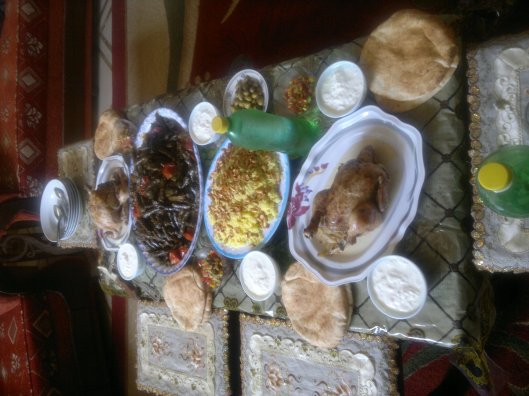
A Palestinian welcome

Ali Abu Nima during one of the workshops

Nora Younis film show!

Rappers: Revolution makers
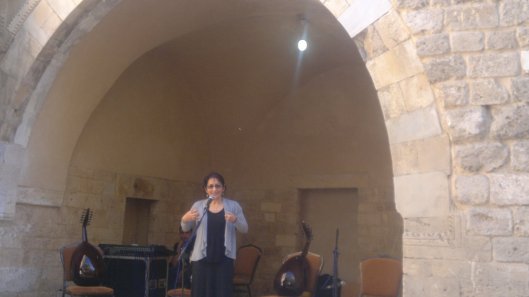
Susan Abu Al hawa during the Cultural event
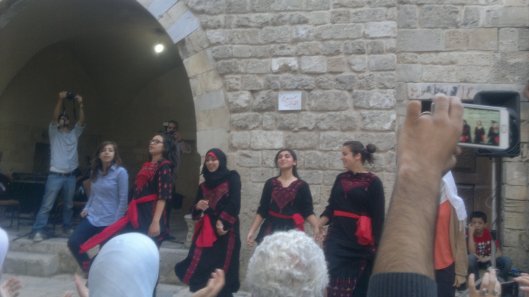
Dabka
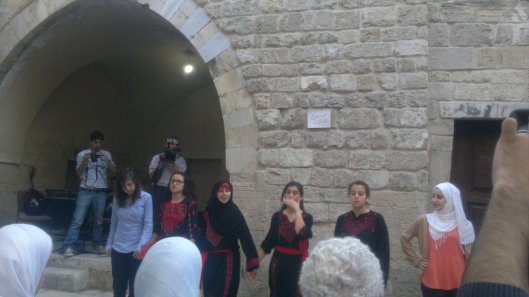


Cultural event at Dar Al Basha
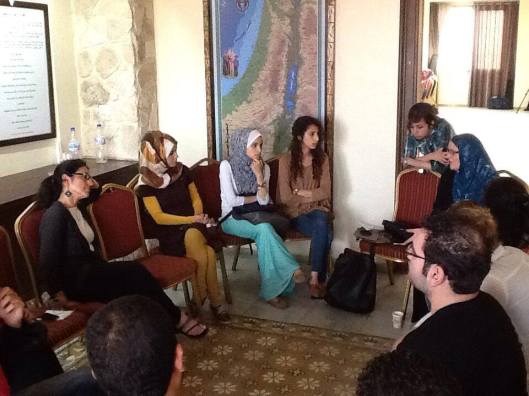
Susan’s workshop on Narrative

Sumaaqiyya at my house

Diwan Ghazzah

